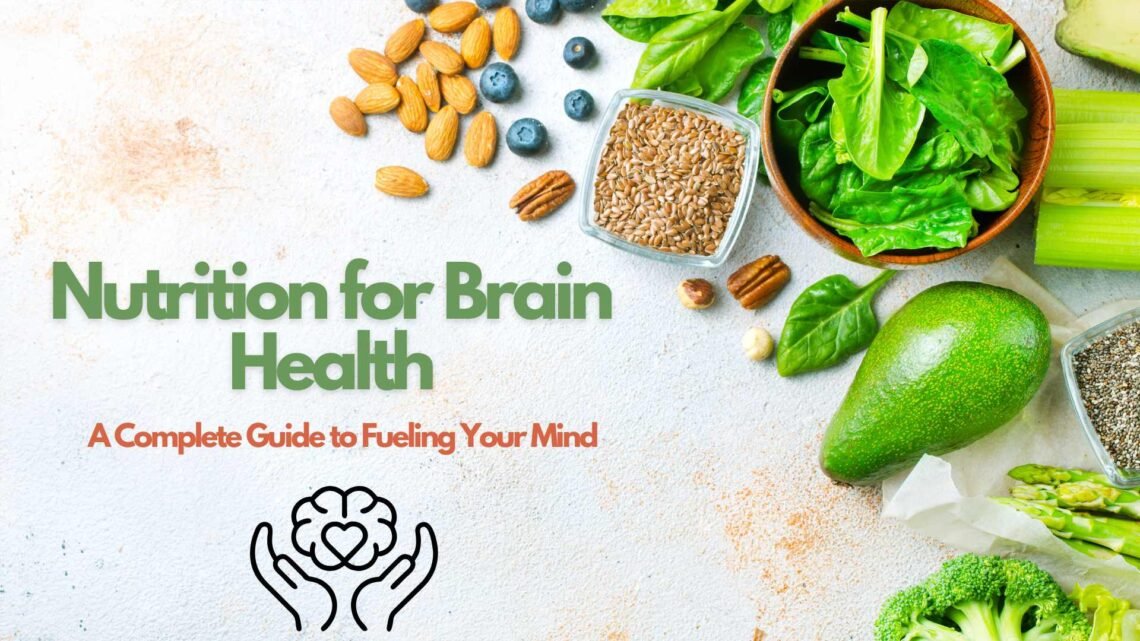In our fast-paced, information-driven world, maintaining optimal brain health has never been more important. Whether you’re a student, a working professional, a senior, or simply someone who values mental clarity, the food you eat plays a powerful role in how well your brain functions. Nutrition for brain health isn’t just about memory—it’s about mood, focus, energy, and long-term cognitive performance.
This comprehensive guide dives into everything you need to know about nutrition for brain health, offering valuable insights to help you nourish your mind and optimize cognitive function. Understanding how food affects brain performance is essential at every stage of life—from improving focus and memory to preventing age-related decline. In this article, you’ll discover the most effective nutrients that support mental clarity, the top brain-boosting superfoods, and practical strategies for planning meals that enhance mental performance.
Whether you’re a student, professional, or senior, these tips are designed to fit seamlessly into your lifestyle. Plus, we share the top 8 expert tips to help you maintain mental sharpness, emotional balance, and long-term brain health. If you’ve been looking for a resource to guide your journey toward sharper thinking, better mood, and lasting mental energy, this complete overview on nutrition for brain health is your trusted roadmap to feeding your brain the right way—every day.
🧬 The Connection Between Nutrition and Brain Health
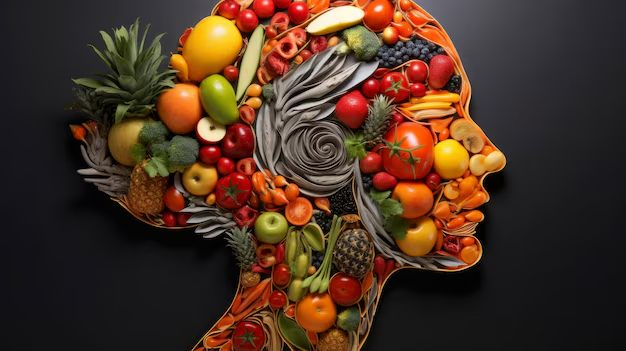
The brain is one of the most energy-demanding organs in the body, using approximately 20% of your total energy each day. To function at its best, it requires a steady and balanced supply of essential nutrients. Proper nutrition for brain health supports everything from neurotransmitter production and neural communication to memory, mood regulation, and protection against oxidative stress. Just as muscles rely on protein and the heart benefits from cardiovascular exercise, the brain depends on the right fuel—nutrient-dense foods packed with vitamins, minerals, antioxidants, and healthy fats.
Without proper nutrition, cognitive functions like focus, decision-making, and emotional balance can suffer. A diet rich in whole foods such as fatty fish, leafy greens, berries, nuts, and whole grains ensures your brain has what it needs to stay sharp, energized, and protected against age-related decline. Investing in nutrition for brain health is a smart, proactive step toward mental clarity and lifelong cognitive strength.
Poor Nutrition Affects:
- Memory and learning
- Concentration and attention span
- Emotional stability
- Sleep patterns
- Risk of neurodegenerative diseases like Alzheimer’s
By optimizing your diet, you can significantly improve cognitive performance, prevent brain fog, and protect your mind as you age.
🧠 Top 8 Tips for Nutrition and Brain Health
1. Prioritize Omega-3 Fatty Acids
Omega-3 fatty acids are among the most vital nutrients when it comes to nutrition for brain health. These healthy fats—especially DHA (docosahexaenoic acid)—are critical for building and maintaining brain cell membranes, which are essential for optimal brain function. Omega-3s also help reduce inflammation in the brain, a major factor linked to cognitive decline and neurological disorders. Regular intake of omega-3s has been shown to improve mood stability, enhance memory retention, and potentially slow the progression of conditions like Alzheimer’s and dementia.
These benefits make omega-3s a cornerstone of any diet focused on nutrition for brain health. Excellent sources include fatty fish like salmon, sardines, and mackerel, as well as flaxseeds, chia seeds, walnuts, and omega-3-enriched eggs. Whether through food or high-quality supplements, ensuring your body receives sufficient omega-3s is a proactive way to support clearer thinking, better emotional health, and long-term cognitive resilience. Your brain truly thrives on this essential nutrient
Sources:
- Fatty fish (salmon, sardines, mackerel)
- Walnuts
- Chia seeds
- Flaxseeds
- Algal oil (for vegans)
Pro Tip: Eat fatty fish 2–3 times a week or supplement with fish oil capsules.
2. Load Up on Antioxidants
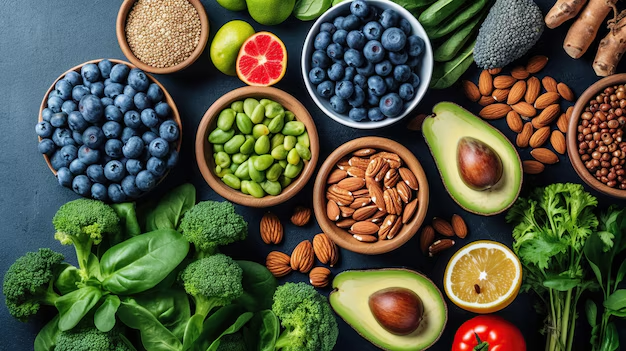
Your brain is especially vulnerable to oxidative stress, a harmful process that accelerates aging and contributes to cognitive decline, memory loss, and neurodegenerative diseases. This makes antioxidants a crucial part of nutrition for brain health. Oxidative stress occurs when free radicals—unstable molecules—build up and damage brain cells. Antioxidants help protect the brain by neutralizing these free radicals, reducing inflammation, and supporting cellular repair.
Including antioxidant-rich foods in your diet, such as blueberries, dark chocolate, leafy greens, nuts, and colorful vegetables, can significantly improve brain resilience and cognitive function. Vitamins like C and E, as well as compounds like flavonoids and polyphenols found in fruits and spices, also play a powerful role in this defense system. By prioritizing antioxidant-rich foods, you provide your brain with the protection it needs to stay sharp and healthy as you age. A strong antioxidant intake is a key strategy in effective nutrition for brain health..
Sources:
- Berries (blueberries, strawberries)
- Dark leafy greens
- Dark chocolate (in moderation)
- Green tea
- Turmeric (curcumin)
Pro Tip: Aim for colorful fruits and vegetables daily—each color represents different brain-protective compounds.
3. Fuel with Complex Carbohydrates
The brain depends on glucose as its primary energy source, but not all glucose sources are created equal. When it comes to nutrition for brain health, choosing complex carbohydrates over simple sugars is essential. Complex carbs, found in foods like whole grains, legumes, fruits, and vegetables, provide a slow and steady release of glucose into the bloodstream. This helps maintain consistent brain energy levels throughout the day, preventing the energy spikes and crashes associated with refined sugars.
Stable glucose levels enhance focus, concentration, and overall cognitive function. In contrast, simple carbs—like those found in sugary snacks and white bread—can lead to brain fog, irritability, and poor mental performance. Including complex carbohydrates as part of your daily diet ensures that your brain receives a reliable fuel supply, supporting clear thinking and balanced mood. For sustained mental performance, make complex carbs a cornerstone of your nutrition for brain health plan.
Sources:
- Oats
- Brown rice
- Quinoa
- Sweet potatoes
- Whole-grain bread and pasta
Pro Tip: Avoid refined sugars and opt for fiber-rich carbs to maintain mental clarity throughout the day.
4. Don’t Forget Brain-Boosting Vitamins
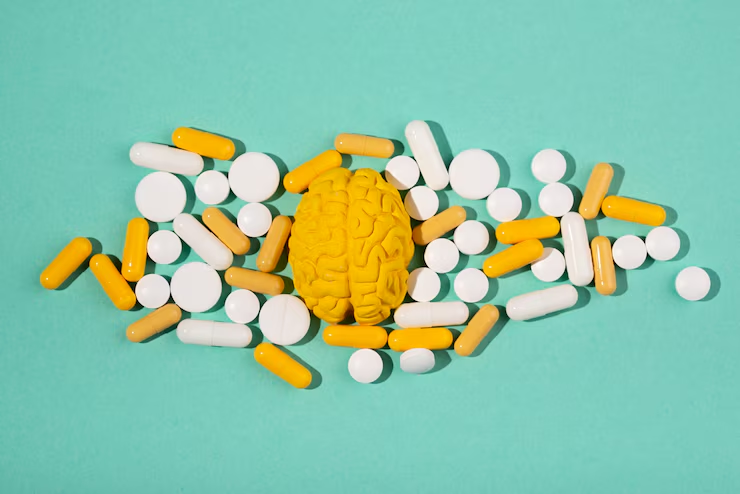
Certain vitamins are vital components of optimal nutrition for brain health, as they support critical brain functions such as neurotransmitter production, neuroprotection, and cellular communication. B vitamins—especially B6, B9 (folate), and B12—are essential for synthesizing neurotransmitters like serotonin, dopamine, and GABA, which regulate mood, focus, and sleep. Deficiencies in these vitamins can lead to cognitive issues, memory loss, and even mental health disorders such as depression or anxiety.
Vitamin D also plays a neuroprotective role, influencing mood and supporting the function of brain cells, while vitamin E acts as a powerful antioxidant, guarding neurons against oxidative stress. Meanwhile, vitamin C helps in iron absorption and supports the immune system, which indirectly benefits the brain. Including a wide variety of colorful fruits, leafy greens, eggs, dairy, nuts, and seeds ensures a rich intake of these brain-supporting nutrients. Prioritizing these essential vitamins through your diet is a smart and proactive step in nutrition for brain health.
Key Vitamins for the Brain:
- B Vitamins (B6, B9, B12): Support brain development and reduce homocysteine, a marker linked to cognitive decline.
- Vitamin D: Enhances mood and supports brain cell function.
- Vitamin E: Powerful antioxidant that helps prevent brain aging.
- Vitamin C: Protects against oxidative stress and supports neurotransmitter function.
Sources:
- Leafy greens, eggs, fish, fortified cereals, citrus fruits, nuts, seeds, and sunlight (for Vitamin D)
Pro Tip: Consider a B-complex supplement if you’re vegan or over age 50.
5. Include Lean Proteins Daily
Proteins are fundamental to nutrition for brain health because they are made up of amino acids—the building blocks of neurotransmitters that directly impact your mood, focus, and mental clarity. Neurotransmitters such as serotonin, dopamine, and norepinephrine are critical for regulating emotions, motivation, alertness, and overall cognitive performance. Amino acids like tryptophan and tyrosine, found in protein-rich foods, are especially important in the synthesis of these brain chemicals. Without adequate protein in your diet, neurotransmitter production can suffer, potentially leading to issues like fatigue, depression, or poor concentration.
Including high-quality protein sources such as eggs, lean meats, dairy, legumes, tofu, and nuts helps maintain balanced brain chemistry and mental performance. Whether you’re a student needing focus, an adult managing stress, or a senior protecting cognitive health, consuming enough protein supports your brain’s needs. Prioritizing protein-rich foods is an essential strategy in any plan focused on effective nutrition for brain health.
Sources:
- Eggs
- Chicken
- Fish
- Tofu
- Lentils
- Greek yogurt
Pro Tip: Combine protein with healthy fats and carbs for balanced brain meals.
6. Stay Hydrated
Hydration is a key yet often overlooked element of nutrition for brain health. Since the brain is composed of approximately 75% water, even mild dehydration can significantly impact its function. When you’re not adequately hydrated, your brain may struggle with tasks that require focus, memory, and decision-making. Dehydration can also lead to headaches, fatigue, irritability, and reduced mental clarity. Water plays a vital role in delivering nutrients to brain cells and flushing out toxins that could impair function.
It also helps maintain the balance of electrolytes, which are essential for transmitting signals between brain cells. To support optimal brain performance, aim to drink water consistently throughout the day—especially when active, during hot weather, or after consuming caffeine. Herbal teas, water-rich fruits like watermelon, and vegetables like cucumber also contribute to hydration. Making proper fluid intake a daily habit is a simple yet powerful step toward improving overall nutrition for brain health and mental performance.
Hydration Tips:
- Drink 8–10 glasses of water daily
- Add lemon, mint, or berries for flavor
- Include water-rich foods like cucumbers, oranges, and watermelon
Pro Tip: Start your day with a glass of water before coffee or tea.
7. Cut Back on Inflammatory Foods
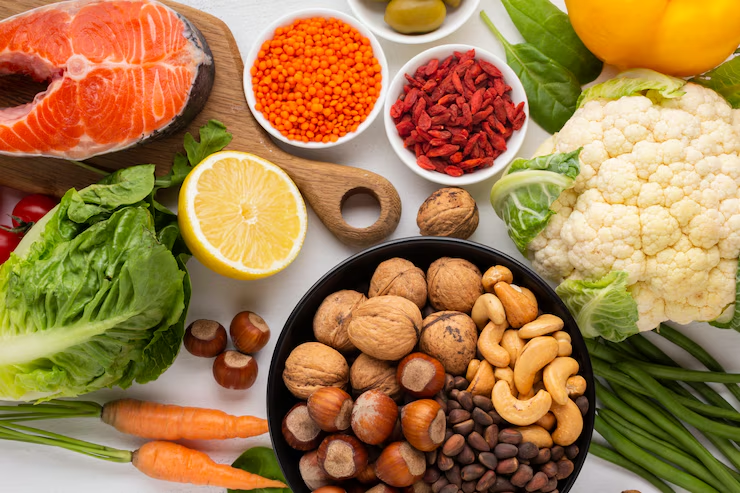
Chronic inflammation is a hidden threat to cognitive function and long-term mental well-being, making it a critical concern in nutrition for brain health. When inflammation becomes persistent, it can disrupt normal brain activity, impair memory, and increase the risk of mood disorders like depression and anxiety. Over time, it may even contribute to the development of neurodegenerative diseases such as Alzheimer’s and other forms of dementia. Poor dietary choices—such as high sugar intake, processed foods, and unhealthy fats—can trigger or worsen inflammation in the brain.
On the other hand, an anti-inflammatory diet rich in omega-3 fatty acids, leafy greens, berries, nuts, and whole grains can protect the brain by calming inflammation and supporting neural health. Foods packed with antioxidants and phytonutrients also help combat inflammatory responses. Prioritizing an anti-inflammatory eating pattern is a powerful and proactive way to support your nutrition for brain health and protect your brain for the future.
Foods to Avoid:
- Sugary drinks
- Fried foods
- Refined carbs
- Excess alcohol
- Trans fats and highly processed snacks
Pro Tip: Replace them with anti-inflammatory foods like turmeric, ginger, nuts, and berries.
8. Eat Regularly and Mindfully
Maintaining a regular eating schedule is essential for stable energy and optimal nutrition for brain health. Skipping meals or eating erratically can cause sudden dips in blood sugar, which negatively impact mood, memory, focus, and overall cognitive performance. The brain relies on a steady supply of nutrients and glucose to function efficiently—when that supply is interrupted, you may experience irritability, brain fog, or fatigue. Practicing mindful eating can help regulate these effects.
By paying attention to what, when, and how you eat, you support better digestion, nutrient absorption, and a stronger connection between your body and brain. Balanced meals eaten at consistent times throughout the day help maintain even energy levels and promote emotional stability. Include complex carbohydrates, lean proteins, healthy fats, and plenty of fiber to support your mental clarity. Adopting mindful eating habits is a simple but powerful strategy for enhancing nutrition for brain health and overall well-being..
Smart Habits:
- Eat 3 balanced meals with healthy snacks in between
- Chew slowly and without distractions
- Focus on your food’s taste, texture, and aroma
Pro Tip: Avoid multitasking during meals—put your phone away and be present.
🥗 Brain-Boosting Meal Ideas
🧃 Brain-Healthy Breakfasts
- Avocado Toast with Egg on whole-grain bread
- Berry & Nut Oatmeal with chia seeds and almond butter
- Spinach & Mushroom Omelet with a side of orange slices
- Greek Yogurt Parfait with walnuts and flaxseeds
🥙 Smart Lunch Options
- Quinoa Salad with chickpeas, cherry tomatoes, and olive oil
- Salmon Wraps with leafy greens and hummus
- Lentil Soup with a slice of whole-grain toast
- Tofu Stir-Fry with broccoli and brown rice
🍲 Cognitive-Boosting Dinners
- Grilled Salmon with roasted sweet potatoes and sautéed kale
- Chicken & Veggie Stew with turmeric and garlic
- Stuffed Bell Peppers with quinoa, black beans, and avocado
- Vegetable Curry with brown rice and coconut milk
🍓 Smart Snacks
- Dark chocolate with almonds
- Apple slices with peanut butter
- Carrot sticks with hummus
- Boiled eggs
- Trail mix with pumpkin seeds, raisins, and walnuts
🧪 Superfoods for Brain Health
Here’s a quick list of scientifically supported superfoods that belong in your kitchen:
| Superfood | Brain Benefit |
| Blueberries | Improve memory and delay brain aging |
| Fatty Fish | Rich in DHA, supports brain cell structure |
| Turmeric | Anti-inflammatory, improves mood |
| Broccoli | High in antioxidants and Vitamin K |
| Pumpkin Seeds | Rich in zinc, iron, magnesium |
| Nuts | Especially walnuts—great for memory and cognitive function |
| Dark Chocolate | Enhances brain plasticity and blood flow |
| Green Tea | Boosts alertness, calm, and brain function |
🧬 Gut-Brain Connection
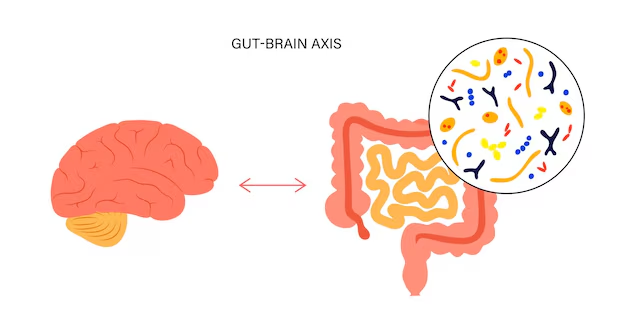
An exciting and growing field in nutrition for brain health is the study of the gut-brain axis—an intricate communication system between your digestive system and your brain. Your gut is home to trillions of beneficial microbes, collectively known as the gut microbiome, which play a major role in your mental and emotional health. These microbes communicate with the brain through pathways like the vagus nerve and produce essential neurotransmitters, including serotonin, which regulates mood, sleep, and stress.
In fact, about 90% of the body’s serotonin is produced in the gut. A balanced gut microbiome supports better focus, reduced anxiety, and improved overall brain function. Poor gut health, on the other hand, has been linked to brain fog, depression, and even cognitive decline. To support both gut and brain health, include probiotics (like yogurt, kefir, and fermented foods) and prebiotics (like garlic, onions, and fiber-rich vegetables) in your diet—key strategies in effective nutrition for brain health..
To support both gut and brain:
- Eat fermented foods (yogurt, kefir, kimchi, sauerkraut)
- Consume prebiotics (bananas, garlic, onions, oats)
- Avoid antibiotics unless necessary
- Reduce sugar and processed foods
- Drink bone broth or take probiotics
🧓 Nutrition for Aging Brains
As we age, the brain naturally experiences structural and functional changes, including slower processing speed and memory challenges. However, proper nutrition for brain health can significantly slow cognitive decline and lower the risk of neurodegenerative diseases like Alzheimer’s and dementia. Key nutrients—such as omega-3 fatty acids, antioxidants, B vitamins, and polyphenols—help protect brain cells, reduce inflammation, and support healthy blood flow to the brain. Foods like fatty fish, berries, leafy greens, nuts, and whole grains are particularly beneficial in preserving brain function over time.
Additionally, maintaining a nutrient-dense diet helps defend against oxidative stress, one of the major contributors to age-related cognitive decline. By choosing brain-supportive foods and minimizing processed items high in sugar and unhealthy fats, seniors can protect their memory, focus, and emotional balance. Embracing a diet tailored to nutrition for brain health is a proactive and empowering step toward staying mentally sharp and independent as we grow older.
Key Nutrients for Seniors:
- Omega-3s to reduce inflammation
- Vitamin B12 (levels decline with age)
- Folate and Choline for memory
- Magnesium for brain plasticity
- Curcumin for neuroprotection
Diets like the MIND Diet (Mediterranean-DASH Intervention for Neurodegenerative Delay) are specifically designed to protect brain health in older adults. It includes:
- Leafy greens
- Whole grains
- Berries
- Beans
- Fish
- Olive oil
- Minimal red meat and sweets
🧘 The Role of Lifestyle Alongside Nutrition
While nutrition is crucial, pairing it with healthy lifestyle choices amplifies its benefits:
- Exercise: Boosts blood flow and neurogenesis
- Sleep: Essential for memory consolidation
- Mental Stimulation: Puzzles, reading, learning new skills
- Social Connection: Reduces risk of depression and cognitive decline
- Stress Management: Chronic stress impairs cognition
🧩 Sample Brain-Healthy Weekly Meal Plan
| Day | Breakfast | Lunch | Dinner | Snack |
| Mon | Berry oatmeal | Quinoa salad | Grilled salmon & kale | Dark chocolate + walnuts |
| Tue | Green smoothie | Lentil soup | Chicken curry & brown rice | Yogurt + flaxseeds |
| Wed | Avocado toast | Chickpea wrap | Stir-fried tofu | Apple + peanut butter |
| Thu | Mushroom omelet | Turkey & spinach bowl | Vegetable stew | Carrot sticks + hummus |
| Fri | Yogurt parfait | Egg salad wrap | Baked cod & broccoli | Trail mix |
| Sat | Banana pancakes | Pasta salad | Veggie stir-fry | Boiled egg |
| Sun | Oatmeal + berries | Tuna quinoa bowl | Stuffed peppers | Fruit smoothie |
✅ Final Thoughts
Optimizing your nutrition for brain health is one of the most powerful steps you can take for mental clarity, mood balance, and long-term cognitive resilience. The foods you choose every day either fuel your focus and memory—or sabotage it. Thankfully, you don’t need drastic changes—just mindful, consistent improvements.
From incorporating Omega-3s and antioxidants to embracing whole foods and reducing inflammation, your brain will thank you. Use the top 8 tips as a daily guide, enjoy delicious brain-boosting meals, and support your cognitive wellness at every stage of life.
